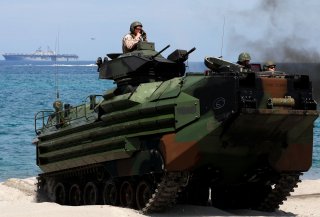Why the U.S. Military Thinks Invading China Is a Terrible Idea
But building the ability to do so may help deter Beijing and keep the peace.
The U.S. Army’s Pacific theater strategy has long maintained that it does not plan to consider a land war against China for a number of key reasons.
First and foremost, perhaps most obviously, deployment would be a problem. How could any kind of mechanized land force, with the requisite expeditionary capability, mobilize for some kind of large-scale land assault on the Asian continent. Where would there be a staging area? Possibly India, a major U.S. ally, could offer some kind of option. Abrams tanks, for example, need to be shipped, deployed and prepared, as do larger infantry carriers, howitzers and other weapons systems. For this reason, the U.S. Army has based its approach on the prospect of joint-attack options with force concentrations possibly launched from Japan, Australia, allied island areas south of China, such as the Philippines or South China Sea area.
Furthermore, China is known to possess a large mechanized force along with as many as one million ground soldiers, a scenario that clearly presents a threat like no other in the world. Then there is the issue of China’s rugged, mountainous terrain, making it almost impossible for larger mechanized forces to advance.
But what about the Pentagon’s plan for a fast-emerging modern Army specifically intended to be more expeditionary, deployable and air-empowered?
For example, several of the new armored vehicles now in development, such as the light tank Mobile Protected Firepower platform, are specifically engineered as lighter weight yet heavily armed, survivable armored attack platforms potentially deployable by air.
Also, what about the Army’s emerging Future Vertical Lift helicopter program, slated to emerge in 2030?
These aircraft have nearly double the range of Black Hawk, Apache and Kiowa helicopters, bringing an entirely new dimension to land-air attack possibilities. The new Attack-Scout and Long-Range FVL helicopters will double combat radius and hit speeds well above 200mph.
Should initial Chinese air and ground defenses be softened with a relentless stealth bomber or carrier-launched air attack, faster, longer-range helicopters could conduct air assaults on inland Chinese targets. C-130s could drop paratroopers in close coordination with close air support from F-22s or F-35s.
Joint networking, increasingly becoming longer range, more integrated, hardened and multi-domain could also easily favor some kind of inland land assault. Fighter jets and surveillance planes now have new data links, improved higher-fidelity sensors and more precise much longer range air-to-ground weapons.
Land attack-capable destroyers such the Zumwalt-class and ship-launched Ospreys and F-35s would complement any kind of major inland attack by hitting fortified defenses. And submarines should not be forgotten as well, given that they are armed with land-attack Tomahawk missiles increasingly able to change course in flight to find and destroy moving inland targets such as Chinese armored forces maneuvering into position.
However, none of this means that U.S. land forces would ultimately prevail in this kind of massive, challenging confrontation. Moreover, the Pentagon does not plan any kind of Chinese invasion. The realistic prospect of success with this kind of operation, nonetheless, could function as some kind of strategic deterrent ultimately designed to prevent war.
Kris Osborn is the new Defense Editor for the National Interest. Osborn previously served at the Pentagon as a Highly Qualified Expert with the Office of the Assistant Secretary of the Army—Acquisition, Logistics & Technology. Osborn has also worked as an anchor and on-air military specialist at national TV networks. He has appeared as a guest military expert on Fox News, MSNBC, The Military Channel, and The History Channel. He also has a Masters Degree in Comparative Literature from Columbia University.
Image: Reuters

